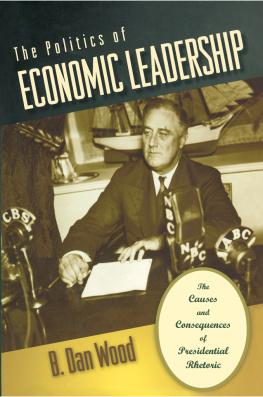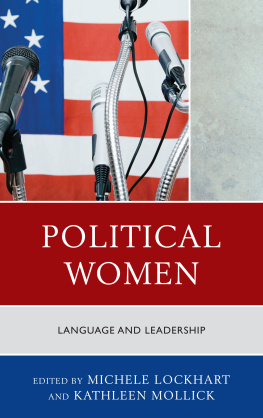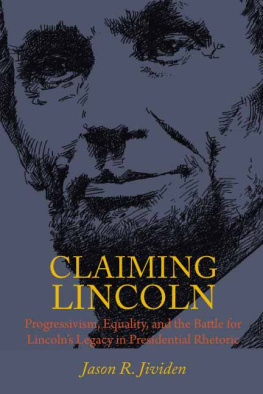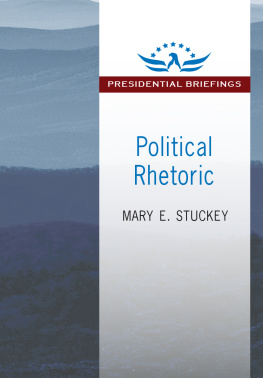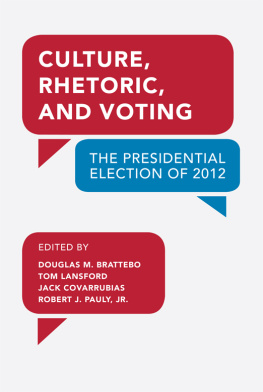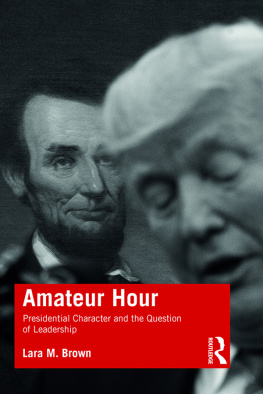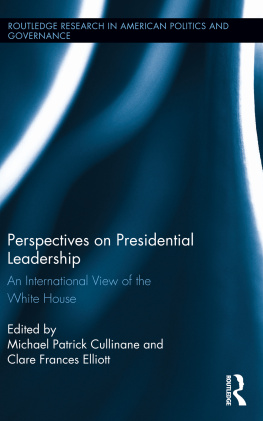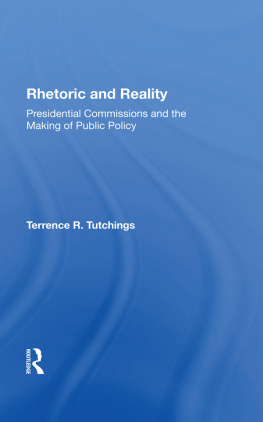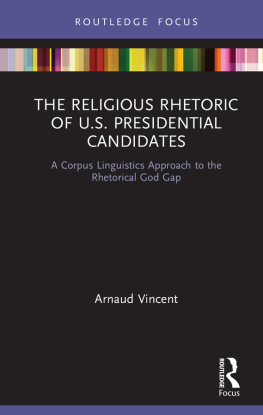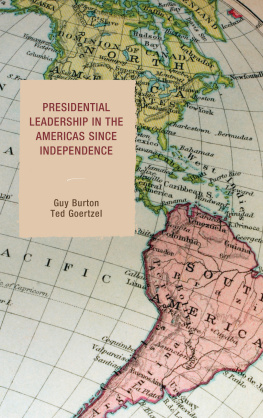Copyright 2007 by Princeton University Press
Published by Princeton University Press, 41 William Street,
Princeton, New Jersey 08540
In the United Kingdom: Princeton University Press, 3 Market Place,
Woodstock, Oxfordshire 0X20 1SY
All Rights Reserved
ISBN-13 (cl.): 978-0-691-12977-8
ISBN-13 (pbk.): 978-0-691-13472-7
eISBN-13 (ebook): 978-0-691-22562-3
British Library Cataloging-in-Publication Data is available
press.princeton.edu
R0
Preface
THIS BOOK examines the causes and consequences of presidential efforts to lead the economy through words. Presidents have been using their words for this purpose at least since Franklin Roosevelt and the Great Depression. In his first inaugural address, President Roosevelt focused his remarks exclusively on the economic decline that had engulfed the nation for over three years. Many people remember the famous quotation from that address:... let me assert my strong belief that the only thing we have to fear is fear itselfnameless, unreasoning, unjustified terror which paralyzes needed efforts to convert retreat into advance. The fear that Roosevelt was referring to was that of continued economic decline. We often credit these and other inspirational words by President Roosevelt with lifting the American spirit from the depths of the Great Depression. The impact of presidential words, however, is actually an empirical matter that can be addressed by scientific research.
Unless there is an international crisis, modern presidents talk more about the economy than any other issue. Thus, one set of empirical research questions addressed in this book concerns the causes of presidential rhetoric on the economy. No modern president has faced an economic crisis of the same magnitude as that faced by President Roosevelt. Yet recurrent economic rhetoric has been a dominant feature of every presidency from that of Truman through George W. Bush. Are presidential remarks on the economy mere politics? Do presidents respond to particular political conditions, such as their approval ratings, public opinion, or election-year incentives? Is presidential rhetoric on the economy a response to particular economic conditions, such as economic growth, unemployment, inflation, or the federal deficit? What determines the intensity and tone of presidential remarks about the economy through time? More generally, do modern presidents, like President Roosevelt, attempt to lead the economy through rhetoric that can spark economic optimism and potentially alter economic outcomes?
Another set of empirical research questions addressed in this book concerns the consequences of presidential rhetoric on the economy. Does presidential rhetoric become lost in the continuous stream of noise characterizing the American system? Or, does the presidents economic rhetoric have actual impacts? For example, do presidential remarks affect peoples assessments of economic conditions such as economic growth, unemployment, or inflation? Do presidential remarks about the economy affect consumer confidence? If so, what are the implications of presidential words for actual economic behavior such as saving, borrowing, and spending? Do the presidents economic remarks have political implications? For example, do they alter peoples assessments of how well the president is doing as an economic leader? Do presidential remarks about the economy alter peoples assessments of presidential leadership generally?
All of the preceding research questions are addressed empirically in this book using a dataset consisting of every unique sentence spoken publicly by the president about the economy from World War II through the first George W. Bush administration. Collecting such a dataset was a formidable task, requiring both technology and human effort. I owe a considerable debt to those who helped with this endeavor.
I had worked with presidential rhetoric earlier when I studied agenda setting and the causes of issue attention in the American system (Edwards and Wood 1999; Wood and Peake 1998; Wood, Flemming, and Bohte 1999). From this earlier work I developed a strong interest in how presidents affect the political system.
The data for the earlier work were collected in the very rudimentary manner of using human coders and the tedious parsing of indices of consecutive paper editions of Public Papers of the Presidents. In January 2001, however, I attended a seminar focusing on PERL and the machine coding of text documents. The seminar was conducted by Phil Schrodt of the University of Kansas. In the months and years after the seminar, I developed PERL programs for manipulating text from large documents, which enabled the coding of an electronic version of the entire Public Papers of the Presidents. This methodological innovation was used in this current project to create a dataset that comprises all presidential remarks about the economy since World War II. For introducing me to PERL, I sincerely thank my friend Phil Schrodt.
There are several others who were influential of this project. George C. Edwards III, my colleague at Texas A&M, was important in encouraging me to explore the causes side of the work. Without the incentive of presenting a paper at his Conference on Researching the Public Presidency in February 2004, I would probably never have moved in this direction. George was also very helpful with assorted advice along the way on both sides of the project. Thanks, George, for always having an open office door.
Jeffrey Cohen of Fordham University read and commented on various convention papers that later became chapters. Jeff also read the entire manuscript when it neared completion and made numerous helpful suggestions. Richard Curtin of the University of Michigan provided the most recent data from the Survey of Consumers when I was up against deadlines and wanted up-to-date data on consumer attitudes. Also, Richards papers on the psychological approach to studying consumer behavior (Curtin 1983; Curtin 2000) became the seed for the theory used on the consequences side of the research in .
I am also indebted to those who provided research assistance. The data on the presidents economic rhetoric were initially machine coded using PERL. Machines are dumb, however, and considerable human effort was required to ensure valid and reliable measures. The bulk of the human effort was supplied by Chris Owens and Brandy Durham over the two-year period from 2001 to 2002. The data were later updated through 2004 and further cleaned by Justin Vaughn, Gilbert Schorlemmer, Daniel Hawes, and Sarah Kessler.
In the interest of future research, I encourage replication of the work reported here, as well as further application of the data. Thus, all of the data on presidential rhetoric reported in the empirical parts of the book are available on my website at Texas A&M University. The web address is currently http://www-polisci.tamu.edu/faculty/wood/. A Google search for my name should also find the data.
Chuck Myers of Princeton University Press offered sage advice on how to craft the manuscript. Given my strong methodological leanings, he encouraged me to focus on substance, rather than minor technical questions that might excite those in the methodological community. Chuck was also a pleasure to work with as an editor, especially in securing expert reviewers and in dealing with deadlines that I promised but seldom met. I also thank two anonymous reviewers for numerous insightful suggestions, most of which are implemented in the final manuscript.

